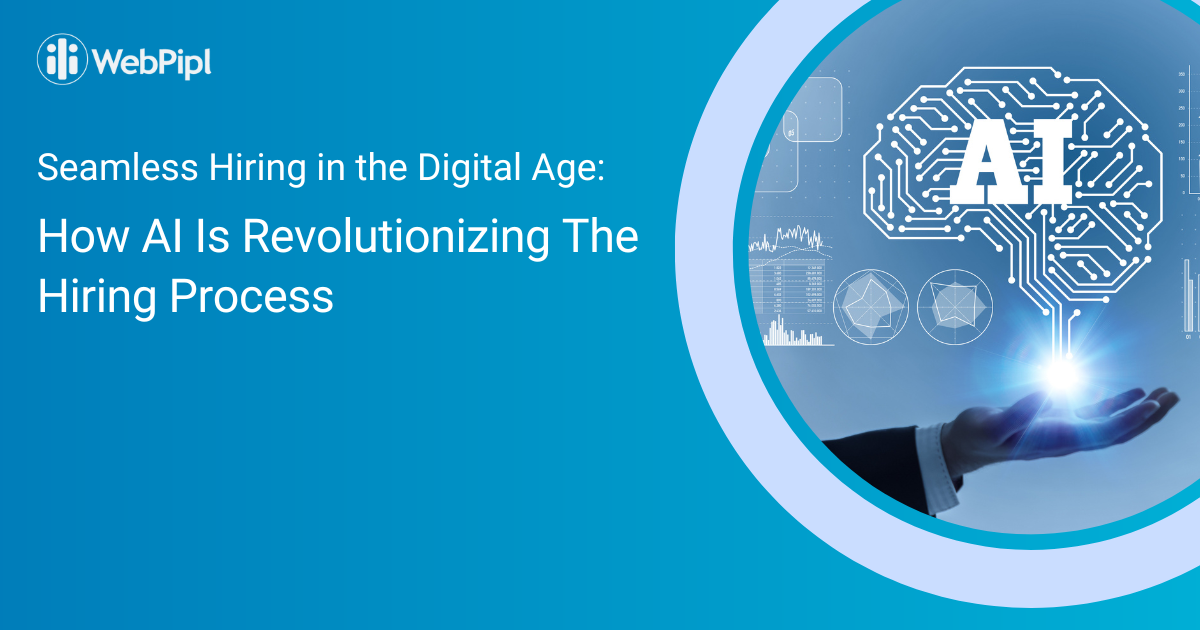
Artificial intelligence (AI) has the potential to revolutionize the recruitment industry by automating and streamlining various tasks and allowing organizations to make more informed hiring decisions. This could help employers to save time and money. In this article, we will explore how AI is being used in the recruitment process and the potential benefits and challenges it presents.
Chatbots & Virtual Assistants
One of the main ways in which AI is being used in recruitment is through the use of chatbots and virtual assistants. These tools can handle initial candidate screenings and answer frequently asked questions, freeing up time for human recruiters to focus on more complex tasks. In addition, chatbots can also be used to schedule interviews and provide candidates with information about the job and the company.
Analyze volumes of data with NLP/ML
AI can also be used to analyze large volumes of resumes and job applications to identify the most qualified candidates. This is done through the use of natural language processing (NLP) algorithms and machine learning (ML), which can extract relevant information from resumes and job descriptions and match them to the best fit.
How AI can help with Seamless Hiring?
There are several ways that artificial intelligence (AI) can help with fast, effective, seamless hiring. Some examples include:
Resume screening:
AI can help to quickly and accurately screen resumes to identify candidates who meet the requirements for a job. This can help to reduce the workload for human recruiters and ensure that only the most qualified candidates are considered. This can be done using natural language processing (NLP) to analyze the content of the resume and extract relevant information such as education, work experience, and skills. The AI system can then compare this information to the job requirements to identify candidates who meet the basic qualifications for the role. So, it is essential that the resumes are optimized for AI.
This saves a lot of workload for human recruiters, who would otherwise have to manually review each resume and determine whether the candidate meets the requirements. It can also help to ensure that all candidates are evaluated consistently, reducing the risk of bias in the hiring process.
Interview scheduling:
 AI can help to automate the scheduling of interviews, allowing recruiters to focus on other tasks. There are a few different ways that this can be done.
AI can help to automate the scheduling of interviews, allowing recruiters to focus on other tasks. There are a few different ways that this can be done.
One approach is to use an AI chatbot to interact with candidates and schedule interviews. The chatbot can ask candidates for their availability and suggest times and dates for the interview. The chatbot can also confirm the details of the interview with the candidate and send reminders.
Another approach is to use an AI scheduling tool to automate the process of scheduling interviews. These tools typically allow recruiters to input their availability, as well as the availability of the candidates, and then automatically schedule the interviews at a mutually convenient time.
Interview questions:
AI can generate standard interview questions based on the job requirements, allowing recruiters to consistently evaluate candidates. This can be done using natural language processing (NLP) to analyze the job description and identify the key skills and experiences that are relevant to the role. The AI system can then use this information to generate a set of standard interview questions that are tailored to the specific job requirements.
Using AI to generate standard interview questions can help to ensure that all candidates are asked the same questions and are evaluated consistently. This can help to reduce bias in the hiring process and make it easier to compare candidates. It’s important to note, however, that AI should be used as just one aspect of the hiring process, and that human judgment and evaluation are also important.
Personality assessment:
 AI can be used to assess the personalities of candidates, helping to identify those who are likely to fit in with the company culture. There are few means to get this done.
AI can be used to assess the personalities of candidates, helping to identify those who are likely to fit in with the company culture. There are few means to get this done.
One approach is to use natural language processing (NLP) to analyze the language used in a resume or cover letter or responses to standardized questions during an interview. This can help to identify personality traits such as conscientiousness, agreeableness, and emotional stability.
Another approach is to use psychological assessment tools, such as personality tests, to evaluate candidates. These tests are designed to measure traits such as extraversion, openness, and agreeableness, and can be administered online or in person.
Predictive analytics:
Another way in which AI is being used in recruitment is through the use of predictive analytics. AI can analyze data from previous hires to identify patterns that predict success on the job. This can help recruiters to make more informed hiring decisions.
This involves using machine learning (ML) algorithms to analyze data about past hires and predict which candidates are most likely to be successful in a particular role. This can be particularly useful in identifying candidates who may not have the most impressive resumes, but who have the potential to excel in the role based on other factors.
AI can help to streamline the hiring process and make it more efficient, while also helping to ensure that the best candidates are identified and selected for the job.
Benefits of AI in recruitment
 There are several potential benefits to using AI in the recruitment process. The most significant is the time and cost savings that it can offer. By automating tasks such as resume screening and scheduling interviews, organizations can reduce the time and resources they need to spend on these tasks. AI can also help to improve the accuracy of hiring decisions by providing objective and data-driven insights that may not be possible for human recruiters to identify. This is something really worth going with AI-based hiring.
There are several potential benefits to using AI in the recruitment process. The most significant is the time and cost savings that it can offer. By automating tasks such as resume screening and scheduling interviews, organizations can reduce the time and resources they need to spend on these tasks. AI can also help to improve the accuracy of hiring decisions by providing objective and data-driven insights that may not be possible for human recruiters to identify. This is something really worth going with AI-based hiring.
Challenges Using AI in recruitment
However, there are also some challenges to using AI in the recruitment process. One of the main concerns is the potential for biased decisions if the algorithms are trained on biased data. It is important for organizations to carefully consider the data that is used to train their AI systems and ensure that it is representative of a diverse range of candidates.
There is also a risk that AI could be used to replace human recruiters, leading to job loss and concerns about the impact on employment. They already are facing a lot of challenges. It is likely that AI will continue to make significant progress and will be increasingly integrated into a wide range of domains, not just recruiting. However, while considering the benefits AI offers, the challenges are something we should make an attempt to overcome.
In conclusion, AI has the potential to greatly enhance the recruitment process by automating and streamlining tasks and providing data-driven insights into candidates. However, it is important for organizations to carefully consider the potential risks and challenges and ensure that they are using AI ethically and responsibly.

Raju Thammala is the founder of WebPipl, an AI-based recruitment company revolutionizing the tech hiring process with products like video interviews, ATS software, etc.
As CEO and founder, Raju Thammala is passionate about leveraging technology to deliver next-gen recruiting services. In his free time, Raju enjoys reading and exploring new cuisines or jet-setting to exotic destinations.
